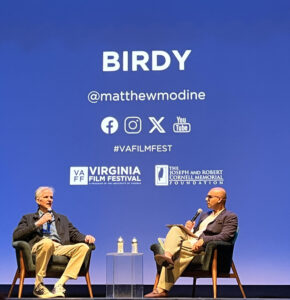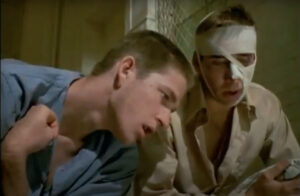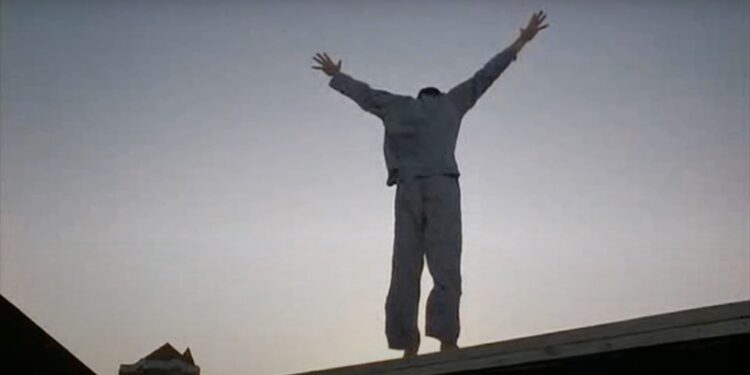Based upon the 1978 William Wharton novel of the same name, Birdy was considered an impossible film to make due to the highly internal nature of the book. In 1984, the trifecta of director Alan Parker and co-stars Matthew Modine (as the character and Nicolas Cage (as Birdy’s best friend Al) proved those naysayers wrong. Upon release, the film won the Grand Jury Prize at Cannes and was listed as film of the year by the National Board of Review. While the film made fans of critics and won awards, what it didn’t do was find an audience. Birdy made for a relatively pricey budget of $12 million ($37 million when adjusted for inflation) and didn’t even make back $1.5 of its budget.
Despite the film’s plaudits, a famous (if highly underrated) director, and two leads who would go on to great success, Birdy does not have much of a legacy. Roger Ebert gave the film four stars at the time, but you rarely hear the film spoken of as among the best of its era.

The fine programmers at The Virginia Film Festival aimed to make us remember what we’ve forgotten (or what many probably discovered) by showcasing the film at a retrospective showing on Birdy’s 40th anniversary this year. Modine was in attendance and amusingly said in the post-film Q&A that he hadn’t seen the film since its release. A fact that became harder to believe listening to Modine speak so eloquently about Birdy.
As hard as Birdy must have been to make into a film, it’s also not the most straightforward movie to write about. In broad strokes, the film is about the relationship of two unlikely South Philly friends: Birdy, a young man infinitely more interested in birds than anything else, and Al, who is into what most teenage boys of the late ‘60s cared about baseball, cars, and girls. There’s no apparent reason these two young men should become friends. The only thing that they have in common is their rugged working-class neighborhood. And yet, after a brief misunderstanding, you believe immediately in the bond of the two young men.
Al’s dad is the angriest trash collector you’ve ever seen, and Birdy’s mom couldn’t hate her son’s interest in ornithology more. I think the connection between Birdy and Al is simple: Al’s never met anyone like Birdy and is therefore intrigued by this strange kid who spends his spare time capturing and training pigeons. Birdy’s eccentricity is so foreign to Al that he can’t help but find him fascinating. Birdy is the antithesis of Al’s ordinary nature. For Birdy, Al is probably the first real friend he’s ever had.
There’s a beautiful (and funny) sequence in the film when Al learns that Birdy has never been to the ocean, so he takes him to the Atlantic. Al thinks Birdy will love the sight of the sea, and he does. Al didn’t expect that Birdy wouldn’t want to come out of the water. Birdy finds swimming in the ocean similar to flying in heavier air, so he doesn’t want to return to the beach. Al just wants to hit the boardwalk and cruise for chicks, but not without Birdy.
Around women, Birdy is particularly childlike and matter-of-fact. The breast-obsessed Al is amusingly frustrated by Birdy calling them nothing but overgrown mammary glands. The first time Birdy gets to touch the naked breast of a prom date who has no idea how poorly a date she has chosen, he taps her bosoms like one might test the feel of something they’d heard about but never seen, like a horse’s tail.
It’s arguable whether Al is ready for adulthood (is anyone ever?). But Birdy, whose obsession with winged and feathered creatures results in him turning his bedroom into an aviary, is in no way ready for the outside world. When the Vietnam draft comes for both of them, it’s no surprise that Al comes out the other side dealing with physical injuries, but Birdy’s are psychological to the point of catatonia.
Director Alan Parker was on a hot streak before taking on Birdy (Bugsy Malone, Midnight Express, Fame, Shoot the Moon, and Pink Floyd: The Wall). He was a diverse filmmaker, seemingly able to work in any genre (he would later make Angel Heart, Mississippi Burning, and Evita). As unusual and complex as all those other films I listed must have been to make, I can’t imagine a more difficult one in the bunch than Birdy. Parker chooses to tell the story out of sequence, pre and post-Vietnam.

Al leaves the war with a badly burnt face, and Birdy is in the military psyche ward—not exactly a place of compassion. In doing so, Parker doubles his challenge by moving us back and forth in time, showing us how they became friends and why Al so badly wants to help Birdy escape the darkness of his one-room cell. In the hands of a less-gifted filmmaker, the flashing forward and back again might be distracting, but Parker’s choice to do so helps unveil their relationship in a way that is almost like a mystery.
Parker also decided not to have the film scored but to use the existing compositions of Peter Gabriel throughout the film. The mood of Gabriel’s music, particularly his use of synths and drums, creates a profound atmosphere and becomes a driving force in a movie that is not interested in pandering to the audience.
There’s an extraordinary sequence where Parker’s camera fixes on a naked Birdy curled up in his aviary, the music starts to pick up, Birdy seems to take leave of his body, and the remainder of the scene is from Birdy’s eye-view, as he sails through alleyways of barking dogs, over a junkyard, rising high above a baseball diamond, and soaring into the clouds. How Parker and crew pulled off that shot is beyond me, and as I sat in the Paramount Theater in Charlottesville, I could feel, as I was taking the film in on the big screen for the first time in my life, my heart was beating through my chest. It was breathtaking.
As difficult as Parker’s duties surely were, Birdy does not work without the extraordinary performances of Modine and Cage. Half of Cage’s face is covered in bandages in the post-Vietnam scenes, and Modine works primarily without speaking. These two very young actors are emoting without the full use of their physical instruments. Cage has to emote without using most of his face, and Modine without his voice.
As the film reaches its emotional climax, we see Cage letting it all go. All his vanity and Nic Cage-ness are entirely absent here. Modine said after the film that as much as he admires Cage as an actor, he doesn’t think Cage has ever been so vulnerable since on film–even going so far as to say that he thinks Cage’s “big” performances are a form of protection from ever having to go to such an open place on camera again (for what it’s worth, Sean Penn said the same thing about Cage years ago on Charlie Rose).
One can argue whether Modine’s theory is correct, but I know I can’t recall ever seeing Cage more naked on screen than at the end of Birdy. Desperate to break through to a young man who would rather be a bird than a human, and appears to have embraced the idea so strongly that there is no coming back, no matter how hard Al begs Birdy.
The film ends on a hopeful and surprisingly funny note. We don’t know what’s next for these two scarred young men, but we believe there is a “next.”
Birdy is a most unusual film. And yes, I have no idea how Parker and crew pulled this film off. It’s a movie about kindness, the love between two men, and our connection to animals.
Early in the film, Birdy asks Al, “Do you like pigeons?”
Al: “What’s to like?”
Birdy: “They fly.”
Al: “They fly. So what?”
Birdy: “That’s enough.”
Is it ever.









